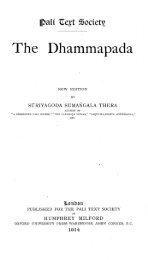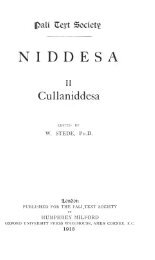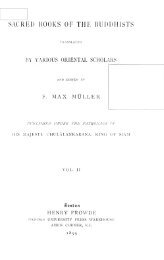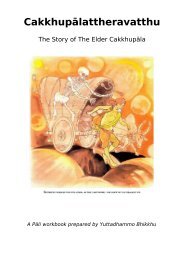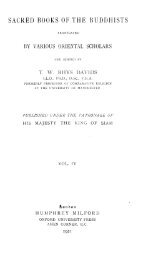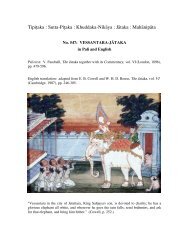Lessons In Practical Buddhism - Sirimangalo.Org
Lessons In Practical Buddhism - Sirimangalo.Org
Lessons In Practical Buddhism - Sirimangalo.Org
Create successful ePaper yourself
Turn your PDF publications into a flip-book with our unique Google optimized e-Paper software.
Simply because of our lack of understanding, our ignorance<br />
and delusion, we create states that are contradictory to our<br />
purpose; we want to be happy but we instead cause<br />
ourselves suffering, which is certainly a sign of ignorance.<br />
This is how the Buddha’s teaching on dependent origination<br />
begins. The first statement in the teaching is “avijjāpaccayā<br />
saṅkhārā” – ignorance creates formations. It is due to<br />
ignorance that our mind gives rise to all of its intentions of<br />
finding happiness in what is unsatisfying. Because of<br />
ignorance, it conceives, gives rise to ideas, intentions and<br />
views, hoping to achieve some sort of lasting happiness<br />
through its machinations.<br />
If we understood that these mental formations were a cause<br />
for suffering, we wouldn’t give rise to them. If we didn’t<br />
have our natural ignorance, if we understood that certain<br />
activities were unable to bring true happiness – for example<br />
cultivating a stable materialistic life, with a nice car, a<br />
luxurious house, a good job, and other pleasant entities –<br />
then we wouldn’t strive towards them and the intention<br />
wouldn’t arise to seek them out. If we understood reality as<br />
it is, we wouldn’t in fact cling to anything, since no arisen<br />
phenomenon can bring true happiness.<br />
If we understood cause and effect perfectly, we wouldn’t<br />
even give rise to those ethical acts that create pleasant<br />
circumstances, such as having good friends, good food, a<br />
good society and so on. We would be content and at peace<br />
with ourselves, acting only as was most appropriate at every<br />
moment without any desire for the attainment of any state<br />
whatsoever. We wouldn’t strive for anything in the world,<br />
because we would understand that striving to attain or<br />
obtain can only build up a concept of me, mine, or I, and a<br />
cause only for more suffering and dissatisfaction.<br />
This fundamental aspect of dependent origination is an<br />
incredibly powerful teaching, because we would normally<br />
think that without intention there could be no happiness;<br />
without intention no good could come from our life. The<br />
ultimate truth, however, is that reality is what it is, it arises<br />
and ceases, comes and goes, and there is no one thing in the<br />
world that can truly make you happy and at peace; nothing<br />
that you can create that won’t be destroyed; nothing that<br />
110



